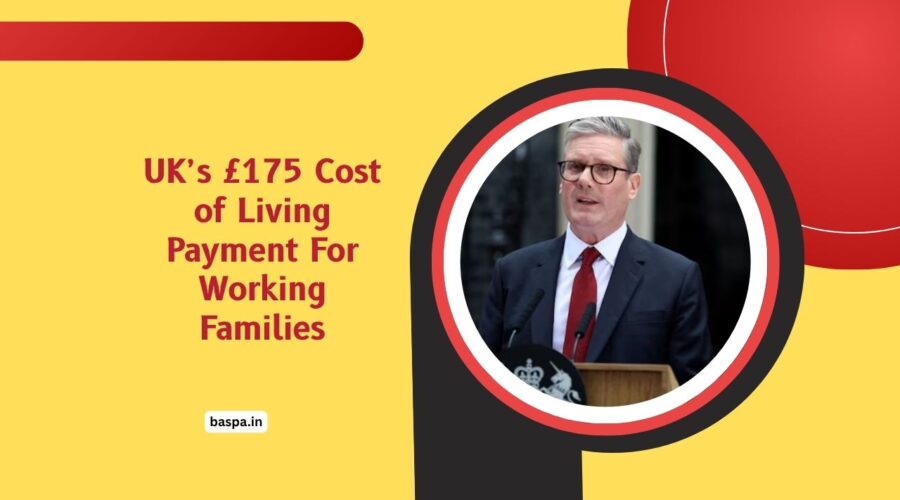UK’s £175 Cost of Living Payment For Working Families – New DWP Support Announced For 2025
In response to ongoing cost‑of‑living pressures, the UK government—via the Department for Work and Pensions (DWP)—is set to deliver a £175 cost‑of‑living payment aimed specifically at working families this summer.
Scheduled for June 2025, this one‑off support payment targets households already receiving qualifying benefits, offering direct financial relief during a period of elevated energy, food, and childcare costs
1. What Is the £175 Cost‑of‑Living Payment?
The £175 cost‑of‑living payment is part of the DWP’s latest targeted intervention to help working families cope with rising daily expenses.
Previous rounds benefitted more broadly—but this round is tailored to households on Universal Credit or Working Tax Credit, ensuring the support reaches those balancing employment with family responsibilities.
2. Who Qualifies and How It Works
- Eligible recipients include households receiving Universal Credit, Working Tax Credit, or similar awards.
- The system is automatic—no new applications are required.
- Payments hit recipients’ bank accounts between mid‑June and end‑June 2025.
- To ensure eligibility, claimants must have updated their DWP records to reflect any changes in work or family circumstances
3. Context: 2024–2025 Benefit Timeline
| Date | Payment / Change | Target Group |
|---|---|---|
| April 2024 | Pensioners & disability claimants received £300 one‑off | Pension and disability recipients |
| October 2024 | Low‑income households received £150 Cost of Living payment | Households on low incomes |
| April 2025 | All benefits uprated by 1.7 %, state pension by 4.1 % | All working‑age recipients & pensioners |
| June 2025 | £175 specifically for working families | Universal Credit & Working Tax Credit users |
| April 2026 (planned) | Benefits standard allowance to increase £7/week above inflation | Universal Credit claimants |
4. Why This Matters Now
- Inflation remains high, with essentials like energy, water, food, and childcare becoming increasingly costly .
- Family poverty is a growing concern—data shows over 14 million people lived in poverty in 2022–23, including children and working adults
- This targeted £175 support illustrates a shift toward precise, needs‑based interventions, rather than universal payments.
5. Broader Welfare Changes in 2025–2026
The Spring Statement (26 March 2025) outlined key welfare reforms
- Universal Credit standard allowance increased by 1.7 % in April 2025.
- State Pension grew by 4.1 % (triple‑lock applied).
- Reforms planned from April 2026:
- Standard allowance to rise £7/week above inflation.
- Health element of Universal Credit will be frozen for existing claimants at £97/week; new claimants will receive £50/week.
- Work Capability Assessment to be scrapped; replaced with Personal Independence Payment (PIP)‑based assessments.
- Legal protections introduced to ensure work does not trigger benefit reassessments
6. Other Ongoing Support
While no new general Cost‑of‑Living Payments are planned in 2025 , the DWP continues to fund the Household Support Fund (HSF)—running April 2025 to March 2026—for cash grants, vouchers, or bill support, managed via local councils.
Additionally, energy provider grants and emergency credit for prepayment meter users remain available through suppliers.
The £175 cost-of-living payment in June 2025 offers timely, targeted relief to working families.
As broader benefit reforms unfold through 2026, this initiative signals a strategic shift toward precision support, ensuring those meeting the challenge of inflation and care responsibilities receive essential financial assistance.
FAQs
Do I need to apply for the £175 payment?
No—this is automatically paid in June 2025 to eligible claimants of Universal Credit or Working Tax Credit.
What if my circumstances changed recently?
Update your details with the DWP straight away, so the system recognises your eligibility.
Will there be more Cost‑of‑Living payments in 2025?
No new payments are planned beyond this round, but additional support remains through the Household Support Fund and energy grants.


Leave a Reply